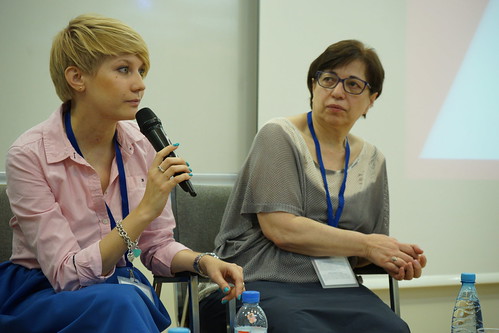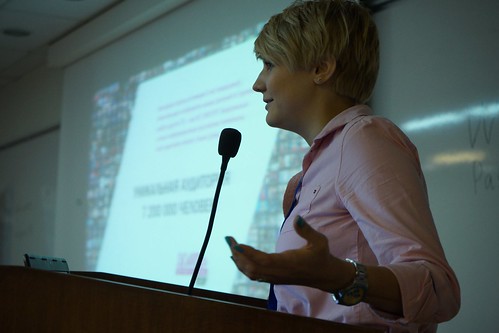In the Russian media industry, Dozhd TV (TV Rain) occupies a unique place: in its five-year history it passed through serious trials which it was able to resist.
The small, independent channel from its inception covered Russian opposition movements, cases of corruption among the ruling elite, and invited on air guests considered unwelcome by state channels.
Emphasizing news, analysis, and reportage, Dozhd TV stood on the brink of being shut down in early 2014, when satellite and cable operators ceased broadcasting the channel (the pretext was its survey on the Leningrad siege of WWII, but the real reason contained political motives).
The television channel was forced to cut staff and expenses, completely migrating to the web and adopting a paid subscription model. It took less than a year for the channel to get back on its feet, gather an audience of seven million, and be able to survive as a business entity.
Head of Dozhd TV’s internet edition Elena Kiryushina believes the channel’s audience are people who are not indifferent. “They, together with our channel, want to build a better country,” she said in Yerevan during the Tvapatum Digital Storytelling Conference [AM], where she presented a talk titled “How the Audience Can Become an Ally” [RU].
It seems impossible to move to a paid internet TV model. But the audience really did become your ally. How did that happen?
We are confident that the audience is more valuable when it pays for content and not when it gets it for free. And the opposite: content becomes of a higher quality when it’s paid for by the audience.
When five years ago we went on air, we weren’t thinking at all about the internet, as there was no money there. Money could be found only in the big networks. When they shut us off from the cable package, initially we were lost. In 2013, we were already a self-sufficient channel, producing expensive post-production films and programs and bringing revenue for cable operators.
It was a real disaster: we had a product, but we couldn’t show it. We were forced to move online, and we begin to develop internet TV. Our audience and advertising revenue drastically declined. We abandoned expensive programs and began to offer live broadcasting (it was cheaper this way).
Many called us crazy when we began to show our meetings, internal discussions and debates on air. But the audience liked this, since it participated in our discussions and wanted to support [us].
 Elena Kiryushina and independent media expert Manana Aslamazyan at the
Elena Kiryushina and independent media expert Manana Aslamazyan at the
Digital Storytelling Conference
Dozhd TV received some serious blows and became a victim of political repression. For victims, as a rule, much can be forgiven. Wasn’t there a concern that the audience is supporting [you] not so much because of the quality of the content as for [your] opposition position?
Perhaps we were considered a victim initially, but now we are trying to move away from that in every way (we survived and thank god). The concert dedicated to our channel’s fifth anniversary became that point after which we took a deep breath because it became clear that we’re many and we’ve established ourselves. It’s interesting that not only our staff, but also the audience felt relieved and free. Now we’re proud and we inwardly constantly want to share our experience with colleagues.
Subscription is a practical model for a news outlet, since first, there is an overall decline in the advertising market and second, political risks are put aside (many advertisers, for example, were simply not allowed to advertise on our channel).
No one can prohibit the audience to pay for content. If until then advertising made up 88% of our budget and we felt confident, well now it’s only 19%. The rest are the subscribers — this year, they were 61% of our budget.
Of course, in the beginning, it seemed that no one will pay for news. But that approach changed. And the more there are news outlets operating on a paid model, the faster the audience will become accustomed to the new situation. I think this will happen also in Armenia.
My favorite day was December 30 of last year, when the instability of the [Russian] rouble prompted people to subscribe to Dozhd TV because we were describing what can be done with their money. It seems absurd, that in a crisis no one will give money to a channel, but people were searching for reliable information. And they found it at our channel.
Last year the channel had a style that was severe and on the attack; now it seems it’s softened its stance.
There came a time when we realized we’ve turned into “barking dogs,” constantly grumbling and complaining. We even received a wake-up call from our audience that, you know, dear friends, it seems to us that your TV channel has been become too obsessed with a game of attack.
But at the time the public itself was in terrible stress. And it seems to me that we were able to collect ourselves and renounce the style of criticizing everything and presenting everything under a negative light at the right time.
After all, one cannot push against the wall invited guests and provoke them to say those thoughts with which they intrinsically don’t agree. First of all, you should allow the guest to speak calmly, to open up, and deliver his words to the audience. By the way, it doesn’t matter who the guest is (a felon, bribe-taker, or even murderer), he must express himself. And a journalist is obliged to be calm and impartial.
 Elena Kiryushina at the Digital Storytelling Conference
Elena Kiryushina at the Digital Storytelling Conference
When the audience is tense and nervous, does the media also become nervous?
Often, it is media itself that creates the tension. Last year, of course, they drove us all crazy, dividing the 86% shouting “Crimea is ours” and supporting the ruling authorities from the remaining 14%. Now the public tension has subsided slightly, though, of course, all of us are always ready to argue in our kitchens. I think, we now have to be even more careful when making interpretations and drawing conclusions. A news outlet should try to maintain a balance and not allow that which is already extremely heated to become even more so.
Dozhd TV also has a certain unkempt, glamorous style…
We are more so accused of being not glamorous but snobbish. It seems to some people that we want to appear extremely smart, and we address our programs only to residents of downtown Moscow. We’re now trying to change this image: we’re adding reportages from different places and trying to talk to everyone in a language that’s understandable.
We also make mistakes on air and we admit our mistakes. Yes, we don’t do slick, combed through, and dressed up programs (such as, for example, Channel One’s programs). We can’t allow ourselves that and, fortunately, we don’t want to either; rather, we put the emphasis on live broadcasting and timeliness. We can easily and quickly modify our network of programs and, it seems with the wave of the magic wand, go on air and talk about the most pressing issues. In other words, we’re free of a lot of obstacles (reaching an agreement, signing documents in advance).
In that sense, it’s easier for us than the others, especially state TV channels.
It seems a clear division (in terms of political views) took place in the Russian media industry, and a small, though interesting space was allocated to Dozhd TV there. Are you going to try to do more?
I’m confident that we can do more — it’s just that now our reach is limited; we’re not yet able to return to broad coverage of the cable networks. If we succeed in reaching an agreement with cable operators and, putting politics aside, engage only in business talk, we will gladly expand and work for a larger audience.
The online paid model also restricted us a little bit, since, in any case, some segments of society reject the idea of paying. The myth that everything must be free still works today. And if all the other news outlets are unpaid, why pay for accessing the content of only one of them?
It’s very difficult to understand the argument that that which at first glance seems free is actually paid for through our taxes. I hope people will change their opinion. We live in an environment where every day we’re forced to change and, as a result, to change also our business model.
Honestly, we see a great potential for growth, since the internet itself is unlimited. Of course, in formidable Russia, there definitely should be more independent news outlets than there are now, when they literally can be counted on the fingers of one hand.
If independent news outlets can be counted on one hand, then they can just as easily be shut down — or deprived of oxygen.
No, it’s not easy to shut down. But they really do block the flow of oxygen (don’t completely shut it down but block it), and it’s preferable that independent news outlets never forget this threat and think about finding additional financial resources and alternative distribution platforms.
In any case, solutions can always be found.
Interview by Nune Hakhverdyan.
Photos by Juliet Martirosyan and Sona Kocharyan.






